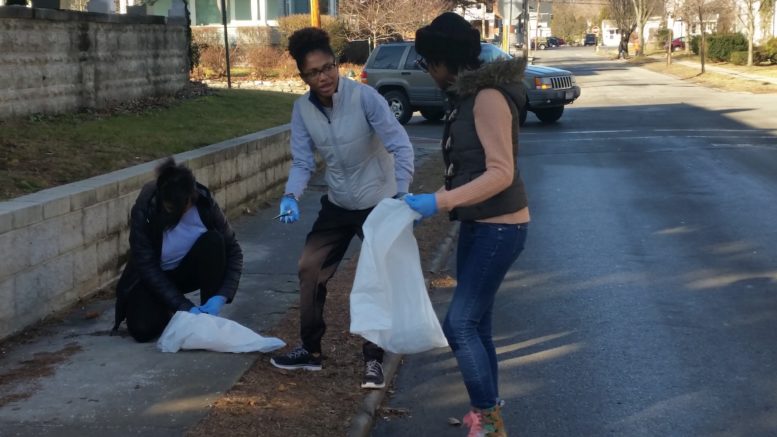By JAN LARSON McLAUGHLIN
BG Independent News
East Side residents may feel like townspeople in “Groundhog Day.” Each year the students may change, but the behavior is strikingly similar – with recurring loud parties, litter and drunken behavior that go with sharing their neighborhoods with college students.
But many students, who are fresh to adulthood and life away from home, have no idea what it means to be a good neighbor, according to Rodney Fleming, whose job it is to help educate students about being a positive part of a community.
“To everyone at this table, this is not new. You’ve had the same problems for years,” Bowling Green State University Student Legal Services’ Fleming said last week during a meeting of the East Side Neighborhood Association. “But we all have to understand, this is new to these students.”
Fleming sympathized with the residents but asked for them to approach student problems with patience and understanding.
“Most of them are intelligent, reasonable people,” he said of students. “If you talk to them, they will listen. They’re humans.”
One year-round resident revealed her secret to establishing a good relationship with her student neighbors – plates of homemade cookies. Even then, there can be problems, she said, like when her young neighbors mistook her front porch for their own. The next day, the students brought her a potted flower to apologize for the flowers they had destroyed.
Fleming applauded that effort, and encouraged cordial communication – especially in light of the current tone of the presidential race. “I think it’s even more important that we all try to be civil. We all have to work together to live together.”
Bowling Green council member Bruce Jeffers agreed. “They are young people learning how to be good neighbors.”
Fleming is one of three full-time attorneys on the Student Legal Services staff, which is not part of the university, but rather contracts with BGSU. The sole clientele of the office are students, who pay $9 per semester to fund the service.
“We like to think of ourselves as the defender of those students, the protectors of those students,” he said.
Each year, about 1,500 students come in for legal counseling – that’s about 10 percent of the student population. The numbers hit 2,237 one year when enrollment was higher.
But in addition to legal representation, Fleming said his primary mission is to educate students on how to live in a community. “Part of my job is helping them to transition from their parents’ nests” to the real world. “I do pride myself, and my staff prides itself, on being reasonable people.”
Efforts to reach students early during orientation have not been very successful since students don’t expect to need legal services, and most parents just can’t envision their children getting into trouble that would require legal representation.
“They honestly believe their students will never need this,” Fleming said of most parents.
But inevitably, at least 10 percent do each year.
The Student Legal Services program was started in the mid 1980s in response to several housing issues.
“At that time, students didn’t feel they had anywhere to turn when they had problems,” such as landlords who were unwilling to make repairs, those who made illegal entries into rental properties, or those who wrongly denied renters their security deposits.
“They were ignorant to what their rights were,” Fleming said of students.
Many of the cases still occur because the student renters don’t read the lease or don’t understand the verbiage before signing.
“They’re not sophisticated consumers. They think, everybody else has done it, where do I sign?”
Fleming has worked hard over the years getting local landlords to use a standardized lease. “We’ve tried to take out all the legalese,” he said.
The biggest problems now are with the “institutional” landlords from Texas and Pennsylvania who operate in Bowling Green. Some of those landlords have leases that are 50 pages long, with all kinds of clauses stacked against student renters.
Since its start 40 years ago, the legal office has evolved into much more than the landlord-tenant piece which now makes up just 10 percent of the cases.
The office has grown to respond to the holistic legal needs of the students, Fleming explained. For example, if a student racks up three underage drinking charges, the office will provide legal advice plus help the student find help for a possible alcohol problem.
The office only handles misdemeanors, since felonies are too time-intensive, he said. Plus, “typically students charged with felonies are not students very long.”
Many cases involve traffic offenses, alcohol or marijuana. Fleming listed off some other recent cases involving civil protection orders, car towing, a wedding venue dispute, employment issues, a golf cart rental, a check cashing scam, storage unit problems, and a name change. In the last 18 months, just 15 students cited for having nuisance parties have sought legal assistance from the office.
A simple offense that results in a car towing can be enough to really disrupt a student’s college career. “Some students are still scraping by,” he said. “These sort of things can derail their studies.”
And though it may not be apparent to some East Side neighbors, an estimated 90 percent of the students who use the legal services are not repeat customers. “Most of the time, they don’t come back. They get it,” Fleming said.

